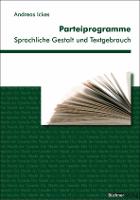Parteiprogramme
Sprachliche Gestalt und Textgebrauch
Abstract
Why a study of political language use? The most important tool in politics is language, as an instrument with which opinions are articulated and disseminated, with which political decisions and decisions representing the will of the people are made. However, the language of politics is also a language of influence. Thus, political parties try to promote their own programs with the help of their party programs (basic programs, election programs) and in this respect represent an important as well as interesting type of text in the field of political communication. Party programs serve, for example, to promote internal party understanding, external self-presentation and as a basis for public understanding. Andreas Ickes presents the text type party program in its various variations and forms of realization. He documents those aspects of the linguistic form that are characteristic of this text type and locates the use of de type party program in the structure of political communication. The detailed presentation is underpinned with cross-party sample material, annotated text passages, or even forms of contrastive analysis. Thus, the analysis and reflection of political language use helps not only to recognize the linguistic possibilities of conveying content, but also to improve one's own critical faculties. Warum eine Untersuchung der politischen Sprachverwendung? Das wichtigste Werkzeug in der Politik ist die Sprache, als Instrument, mit dem Meinungen artikuliert und verbreitet werden, mit dem politische und den Willen des Volkes repräsentierende Entscheidungen getroffen werden. Die Sprache der Politik ist jedoch auch eine Sprache der Beeinflussung. So versuchen politische Parteien, mit Hilfe ihrer Parteiprogramme (Grundsatzprogramme, Wahlprogramme) für die eigene Programmatik zu werben und stellen insofern einen wichtigen wie interessanten Texttyp im Bereich der politischen Kommunikation dar. Die Parteiprogramme dienen etwa der innerparteilichen Verständigung, der Selbstdarstellung nach außen und als Grundlage für die Verständigung in der Öffentlichkeit. Andreas Ickes stellt den Texttyp Parteiprogramm in seinen diversen Spielarten und Realisierungsformen vor. Er dokumentiert diejenigen Aspekte der sprachlichen Gestalt, die für diesen Texttyp charakteristisch sind und verortet den Gebrauch von de Typs Parteiprogramm im Gefüge der politischen Kommunikation. Die detaillierte Darstellung ist mit parteiübergreifendem Beispielmaterial, kommentierten Textstellen oder auch Formen der kontrastiven Analyse unterfüttert. So hilft die Analyse und Reflexion der politischen Sprachverwendung, die sprachlichen Möglichkeiten der Inhaltsvermittlung nicht nur zu erkennen, sondern auch die eigene Kritikfähigkeit zu verbessern.
Keywords
party program; manifesto; political communication; political images; speech communication; political campaign speeches, political partiesDOI
10.14631/978-3-96317-708-8ISBN
9783963177088, 9783941310032, 9783963177088Publisher
Büchner-VerlagPublication date and place
Darmstadt, 2008Classification
Communication studies
Political parties and party platforms
Political campaigning and advertising


 Download
Download Web Shop
Web Shop